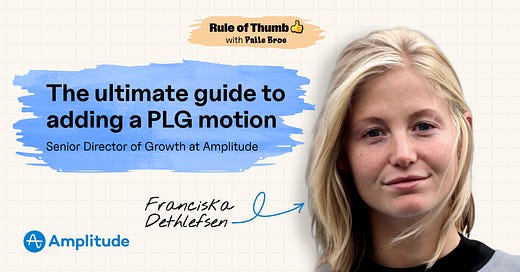Question: We are a B2B SaaS company and we are thinking of exploring PLG - how do we do it?
Most SaaS companies I know ask themselves this exact question at some point, typically for one of the following reasons:
Current ACV (Average Contract Value) is too low for a sales-led strategy: If the ACV is below $20K, a GTM strategy with a lower CAC (Customer Acquisition Cost) is essential - PLG is ideal for achieving this.
SMBs are no longer part of your ICP (Ideal Customer Profile): You may have a segment of legacy SMB customers who no longer fit your ICP. You can either phase out this revenue entirely or find a cost-effective way to acquire and serve them - PLG is well-suited for this approach.
Top-of-funnel demand is lacking: PLG is effective for building awareness, usage, and sign-ups, which can bolster top-of-funnel demand.
In all of the above cases, PLG complements a sales-led strategy rather than replacing it.
To further deep-dive on how companies can best add PLG to their existing offering I teamed up with Franciska Dethlefsen who is one of the experts in the field. She is the growth marketing leader at Amplitude and has been at the forefront of an ambitious Product-Led Growth (PLG) transformation at the digital analytics company. Since joining Amplitude through its acquisition of Iteratively, Franciska has led a 15-person team across acquisition, retention, monetization, and community, driving the evolution of their self-service model.
In today’s newsletter, she shares:
What PLG is
Definition of the three core GTM strategies (PLG, PLS and Sales Led)
How to know if PLG is right for your company
Funnel breakdown: PLG vs Sales led
A step-by-step for how an existing company can get started with PLG





